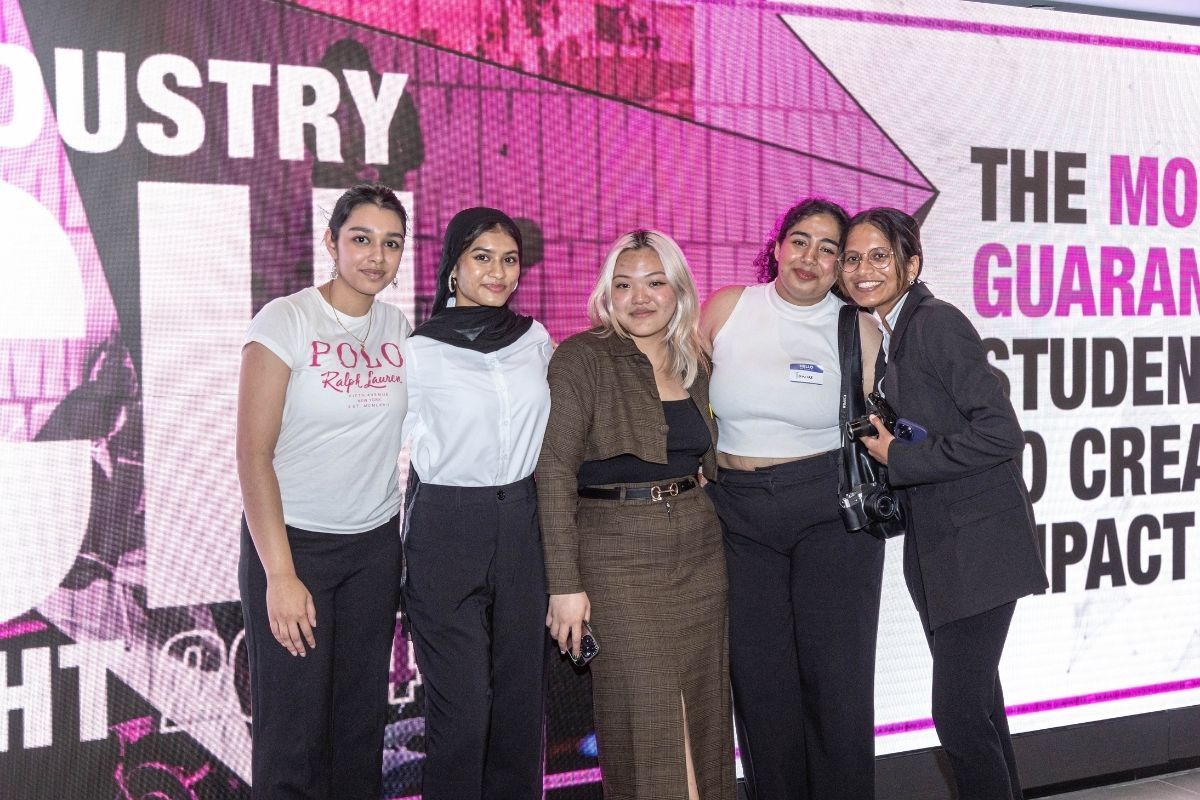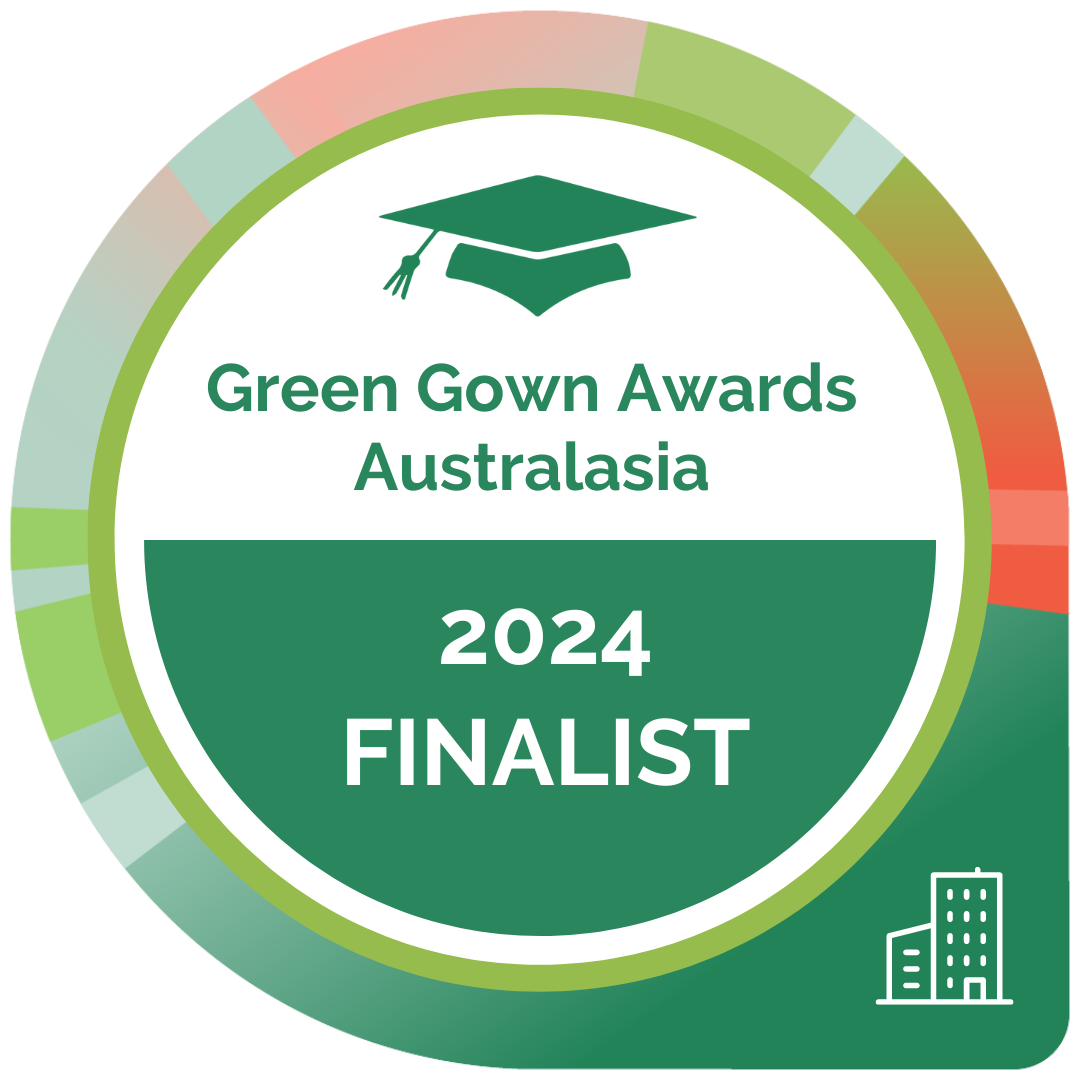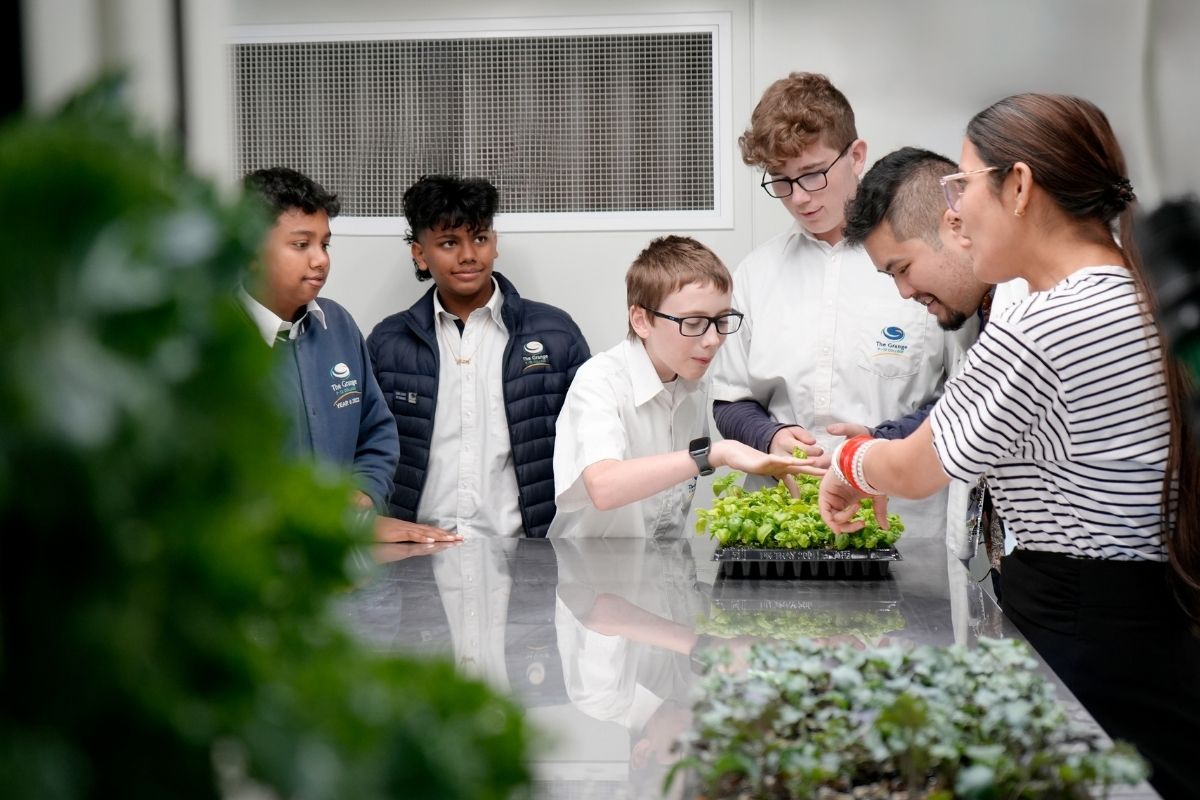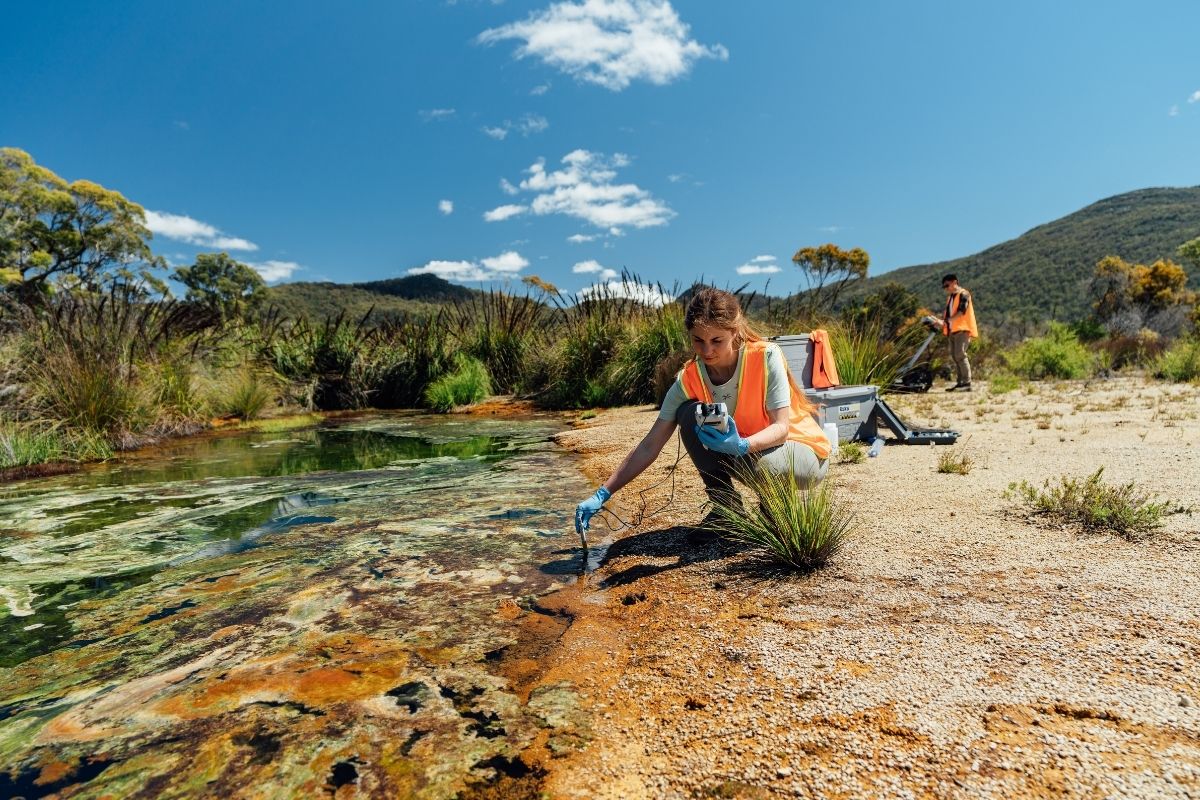Next Generation Learning & Skills category
Monash University’s “Future Skills for the SDGs: Change Agents at the Forefront of Social and Commercial Enterprise” is a pioneering educational initiative that prepares students to tackle global challenges through the Monash Innovation Guarantee (MIG). This program is designed to equip students with the skills and mindsets necessary to advance the Sustainable Development Goals (SDGs) by engaging them in real-world industry challenges whilst they study. Since students can lead in sustainability right now, rather than only once they graduate, MIG brings together students, academics, and a diverse array of industry and innovation leaders in a networked learning community that transcends traditional educational boundaries. MIG is an essential part of the innovation scene in the state and country. The program emphasises cross-sectoral, intergenerational, and interdisciplinary collaboration, empowering students to work hand-in-hand with partners to generate tangible and positive social and environmental impacts through a 3-week, credit-bearing industry experience.

Environmental and Social Benefits
- Sustainable Impact Solutions: Students participating in MIG have developed solutions to industry challenges that an organisation is authentically grappling with, to address critical global issues such as sustainability, climate change, and social equity. These solutions are often implemented by partner organisations (70%), leading to tangible environmental and social benefits across sectors.
- Promotion of Sustainable Practices: MIG projects focus on promoting sustainable business practices, circular economy principles, and ethical decision-making, all of which contribute to broader societal goals and the advancement of the SDGs.
- Community and Industry Engagement: The program fosters strong partnerships with industry, government, the United Nations and non-profit organisations, ensuring that students’ work has a meaningful impact on the community and contributes to sustainable development.
Leadership and Engagement
- Collaborative Learning Environment: MIG is a collaborative hub that unites over 600 students from various disciplines with industry partners and innovation and sustainability leaders from across Australia, creating a rich learning environment where students can apply their knowledge to real-world challenges working with and for society. The program’s interdisciplinary approach ensures that students are exposed to diverse perspectives and develop the skills needed to lead in complex environments, which they experience during the program.
- Industry Partnership Model: The initiative is supported by a mutual benefit model, where students gain hands-on experience while industry partners benefit from fresh, innovative ideas that can be implemented within their organisations. This model fosters a dynamic and reciprocal relationship between academia and industry.
- Scalable and Inclusive: MIG is designed to be scalable, allowing all interested students from across the university with access to industry experiences, regardless of their discipline or background. This inclusivity ensures that a diverse group of students can participate and contribute to the program’s success.
Significance to the Sector
- Innovative Educational Model: MIG is the first program of its kind in Australia, offering a unique approach to education that integrates SDG-focused learning with practical industry experience at scale. Its success has positioned Monash University as a leader in sustainability education and has inspired similar programs at other institutions.
- Sector Leadership: The program’s ability to engage students in meaningful industry partnerships while advancing the SDGs sets a new benchmark for higher education. MIG’s emphasis on real-world impact, collaboration and implementation across sectors demonstrates Monash’s leadership in supporting students to make a difference while preparing them for the future workforce.
- Global Impact: MIG’s success has led to its expansion across Monash’s international campuses, further enhancing its global reach and influence. The program’s focus on global challenges ensures that its impact extends beyond Australia, contributing to international efforts to achieve the SDGs, including in Indonesia and Malaysia.
Wider Societal Impact
- Career and Skill Development: MIG equips students with critical skills in innovation, leadership, and sustainability, allowing them to drive change today while also preparing them for impactful careers in various sectors. The program’s emphasis on real-world problem-solving ensures that graduates are well-prepared to lead in addressing global challenges. The program significantly increased 14 different employability and leadership skills.
- Cross-Sectoral Collaboration: The program has facilitated new partnerships and collaborations between diverse industry sectors, leading to innovative solutions that address complex societal issues. This cross-sectoral approach fosters a collaborative mindset that is essential for advancing the SDGs.
- Empowerment of Future Leaders: By providing students with the tools, networks and opportunities to engage with real-world challenges, MIG empowers them to become change agents and strategic leaders who can drive positive social and environmental change today and in their future careers.
Monash University’s “Future Skills for the SDGs” initiative is a groundbreaking program that demonstrates the university’s commitment to sustainability and innovation. Through its unique approach to education, which combines interdisciplinary learning with real-world industry experience, MIG not only enables students to act today and prepares students to address global challenges in their future but also sets a new standard for higher education. The program’s success in fostering cross-sector collaboration, driving social and environmental impact in organisations, and preparing the next generation of leaders underscores its significance within the sector and beyond, making it a model for other institutions to follow.
Top 3 learnings
Supported by

Category finalists
Next Generation Learning & Skills
Next Generation Learning & Skills
Next Generation Learning & Skills/Winners
Next Generation Learning & Skills/Winners
Next Generation Learning & Skills
Next Generation Learning & Skills
Past winners
Benefitting Society/Winners
Benefitting Society/Winners
Diversity, Equity & Inclusion in Sustainability/Winners
Diversity, Equity & Inclusion in Sustainability/Winners
Climate Action/Winners
Climate Action/Winners
Sustainability Institution of the Year/Winners
Sustainability Institution of the Year/Winners
Creating Impact/Winners
Creating Impact/Winners
Creating Impact/Winners
Creating Impact/Winners
Top 3 learnings
Next Generation Learning & Skills category
Monash University’s “Future Skills for the SDGs: Change Agents at the Forefront of Social and Commercial Enterprise” is a pioneering educational initiative that prepares students to tackle global challenges through the Monash Innovation Guarantee (MIG). This program is designed to equip students with the skills and mindsets necessary to advance the Sustainable Development Goals (SDGs) by engaging them in real-world industry challenges whilst they study. Since students can lead in sustainability right now, rather than only once they graduate, MIG brings together students, academics, and a diverse array of industry and innovation leaders in a networked learning community that transcends traditional educational boundaries. MIG is an essential part of the innovation scene in the state and country. The program emphasises cross-sectoral, intergenerational, and interdisciplinary collaboration, empowering students to work hand-in-hand with partners to generate tangible and positive social and environmental impacts through a 3-week, credit-bearing industry experience.

Environmental and Social Benefits
- Sustainable Impact Solutions: Students participating in MIG have developed solutions to industry challenges that an organisation is authentically grappling with, to address critical global issues such as sustainability, climate change, and social equity. These solutions are often implemented by partner organisations (70%), leading to tangible environmental and social benefits across sectors.
- Promotion of Sustainable Practices: MIG projects focus on promoting sustainable business practices, circular economy principles, and ethical decision-making, all of which contribute to broader societal goals and the advancement of the SDGs.
- Community and Industry Engagement: The program fosters strong partnerships with industry, government, the United Nations and non-profit organisations, ensuring that students’ work has a meaningful impact on the community and contributes to sustainable development.
Leadership and Engagement
- Collaborative Learning Environment: MIG is a collaborative hub that unites over 600 students from various disciplines with industry partners and innovation and sustainability leaders from across Australia, creating a rich learning environment where students can apply their knowledge to real-world challenges working with and for society. The program’s interdisciplinary approach ensures that students are exposed to diverse perspectives and develop the skills needed to lead in complex environments, which they experience during the program.
- Industry Partnership Model: The initiative is supported by a mutual benefit model, where students gain hands-on experience while industry partners benefit from fresh, innovative ideas that can be implemented within their organisations. This model fosters a dynamic and reciprocal relationship between academia and industry.
- Scalable and Inclusive: MIG is designed to be scalable, allowing all interested students from across the university with access to industry experiences, regardless of their discipline or background. This inclusivity ensures that a diverse group of students can participate and contribute to the program’s success.
Significance to the Sector
- Innovative Educational Model: MIG is the first program of its kind in Australia, offering a unique approach to education that integrates SDG-focused learning with practical industry experience at scale. Its success has positioned Monash University as a leader in sustainability education and has inspired similar programs at other institutions.
- Sector Leadership: The program’s ability to engage students in meaningful industry partnerships while advancing the SDGs sets a new benchmark for higher education. MIG’s emphasis on real-world impact, collaboration and implementation across sectors demonstrates Monash’s leadership in supporting students to make a difference while preparing them for the future workforce.
- Global Impact: MIG’s success has led to its expansion across Monash’s international campuses, further enhancing its global reach and influence. The program’s focus on global challenges ensures that its impact extends beyond Australia, contributing to international efforts to achieve the SDGs, including in Indonesia and Malaysia.
Wider Societal Impact
- Career and Skill Development: MIG equips students with critical skills in innovation, leadership, and sustainability, allowing them to drive change today while also preparing them for impactful careers in various sectors. The program’s emphasis on real-world problem-solving ensures that graduates are well-prepared to lead in addressing global challenges. The program significantly increased 14 different employability and leadership skills.
- Cross-Sectoral Collaboration: The program has facilitated new partnerships and collaborations between diverse industry sectors, leading to innovative solutions that address complex societal issues. This cross-sectoral approach fosters a collaborative mindset that is essential for advancing the SDGs.
- Empowerment of Future Leaders: By providing students with the tools, networks and opportunities to engage with real-world challenges, MIG empowers them to become change agents and strategic leaders who can drive positive social and environmental change today and in their future careers.
Monash University’s “Future Skills for the SDGs” initiative is a groundbreaking program that demonstrates the university’s commitment to sustainability and innovation. Through its unique approach to education, which combines interdisciplinary learning with real-world industry experience, MIG not only enables students to act today and prepares students to address global challenges in their future but also sets a new standard for higher education. The program’s success in fostering cross-sector collaboration, driving social and environmental impact in organisations, and preparing the next generation of leaders underscores its significance within the sector and beyond, making it a model for other institutions to follow.
Supported by

Related finalists
Next Generation Learning & Skills
Next Generation Learning & Skills
Next Generation Learning & Skills/Winners
Next Generation Learning & Skills/Winners
Next Generation Learning & Skills
Next Generation Learning & Skills
Other finalists
Climate Action

Driving Towards Tomorrow’s Campus with Vehicle-to-Grid EV Technology
As part of Flinders University’s drive to innovate and become a leader in climate action, the University launched its Vehicle-to-Grid (V2G) initiative. This involved installing and maintaining 20x V2G and smart chargers for its growing electric vehicle fleet. Leveraging 100% renewable energy generated by ENGIE’s Willogoleche Wind Farm and Flinders University’s solar power systems, this enables the storage of renewable energy in EV batteries to be discharged on campus during peak demand periods. Hence, allows for these EV fleets to operate as a Virtual Power Plant (VPP) to deliver peak demand management and optimization of behind-the-meter generation.
Overall, this initiative demonstrates the reliability and scalability of bi-directional and uni-directional smart-charging systems for EVs in reducing GHG emissions while facilitating teaching, research, and innovation opportunities. Moreover, it exemplifies a sustainable and innovative solution to scale energy storage technology and increase renewables.
Sustainability Champion – Staff/Winners

Brandan Espe
Environmental Officer / Acting Grounds Supervisor
Brandan has brought over 50 federally listed Endangered species of plant into the James Cook University living collection, many of which have never been cultivated and are found in no other collection in the world.
Of these, over half have been sustainably wild collected, inclusive of field and clone data, so they can be used for ongoing conservation, research and teaching, the remaining being sourced from private and partner organisations through favours of service or trades.
He personally funded the project from 2019-2022, until funding was awarded for the program due to its success, with the program now being engrained into the Universities landscapes for ongoing management should he leave JCU, creating a threatened species legacy collection.
The program has now expanded beyond this, with an additional 48 species now funded for further addition, some of which are only known from less than 5 sightings in history.
Student Engagement

Sustainability Leaders creating real impact!
La Trobe created a unique Sustainability Leaders volunteering program to increase engagement with students on campus and empower them to act against waste and promote sustainability. It included the following initiatives:
- Promoting the reusable crockery implementation,
- Increasing knowledge action of other students on campus to diversion comingled recycling and organic waste from landfill.
- Focus on waste audits and data,
- Improved signage through new waste posters for students living on campus.
- Collaboration with Cirka (our cleaning and waste partner) to create a waste wall and;
- Learning all things sustainability (net zero, biodiversity, waste, reusables, engagement)
These initiatives yielded significant results and with a reduction in waste contamination by almost 40% at the residential buildings and engagement with over 80 groups of people for the Reusable Revolution.
Creating Impact

Where knowledge meets habits: Empowering students for a sustainable tomorrow
Our online Sustainability Challenges offer participants an engaging, self-paced learning experience centered around a specific United Nations Sustainable Development Goal (UNSDG). Requiring minimal resourcing and at zero-cost to participants, we’ve created replicable, compact, scalable, and impactful learning opportunities that result in real impact.
The Challenges follow a structured process that moves participants from knowledge gain to simple action to celebration, to establish small but mighty habits relating to waste and carbon emissions. This approach recognises that knowledge alone is often insufficient to drive behaviour change, and that ease of action and celebration are crucial components in creating sustainable habits.
Sustainability Champion – Staff/Winners

Catherine (CeeJay) Donovan
Veterinary nurse – Anaesthesia
From establishing the Massey Vet School Green Team to leading impactful initiatives, my commitment to environmental sustainability has been making waves. With the help of my team, I have accomplished numerous small, yet meaningful actions, including integrating a sustainability lecture for final year vet students and implementing battery recycling alongside rechargeable battery use. Our larger projects encompass the introduction of green waste and soft plastics recycling bins, an energy audit resulting in power-saving measures, and playing a part in a successful rubbish audit. I spearheaded the ‘6 in 6’ campaign, empowering individuals with six simple steps for workplace sustainability. Through the SustainaVet social media pages I help to educate and inspire peers nationwide. As the Massey School of Veterinary Science sustainability champion, I had the privilege of speaking at the annual veterinary conference on sustainability in clinical practice. Currently I’m conducting pioneering research on responsible cat waste disposal. Together, we’re forging a greener future, one initiative at a time.
Sustainability Champion – Student

Louis Walmsley
SDG Coordinator Monash Association of Sustainability, Office Bearer Monash Student Association’s Environmental and Social Justice Department, Masters of Environment and Sustainability Student
Louis is an exceptional student sustainability leader at Monash University. His passion and dedication to sustainability have made a significant impact on the community. Louis’s values revolve around sustainability, which is evident upon meeting him. He actively participates in various sustainability groups, demonstrating his commitment to creating a more environmentally conscious society.
One of Louis’s notable involvements is with Precious Plastic Monash, where he organizes remarkable events and fosters collaboration among like-minded individuals, student groups, and staff. His contributions to the Monash Association of Sustainability have allowed him to conduct valuable research on plastic usage and climate action, resulting in positive changes within the university.
Through his work with the Monash Student Association, Louis has engaged hundreds of students in fun and interactive sustainability initiatives. He took the initiative to organize a sustainability food fair, which was one of the largest sustainability-related events held at Monash post-COVID. This accomplishment is a true testament to Louis’s hard work and creativity.
Louis is an outstanding student leader whose efforts in sustainability have had a lasting impact on Monash University and its community. His inspiring nature resonates with everyone who knows him.














